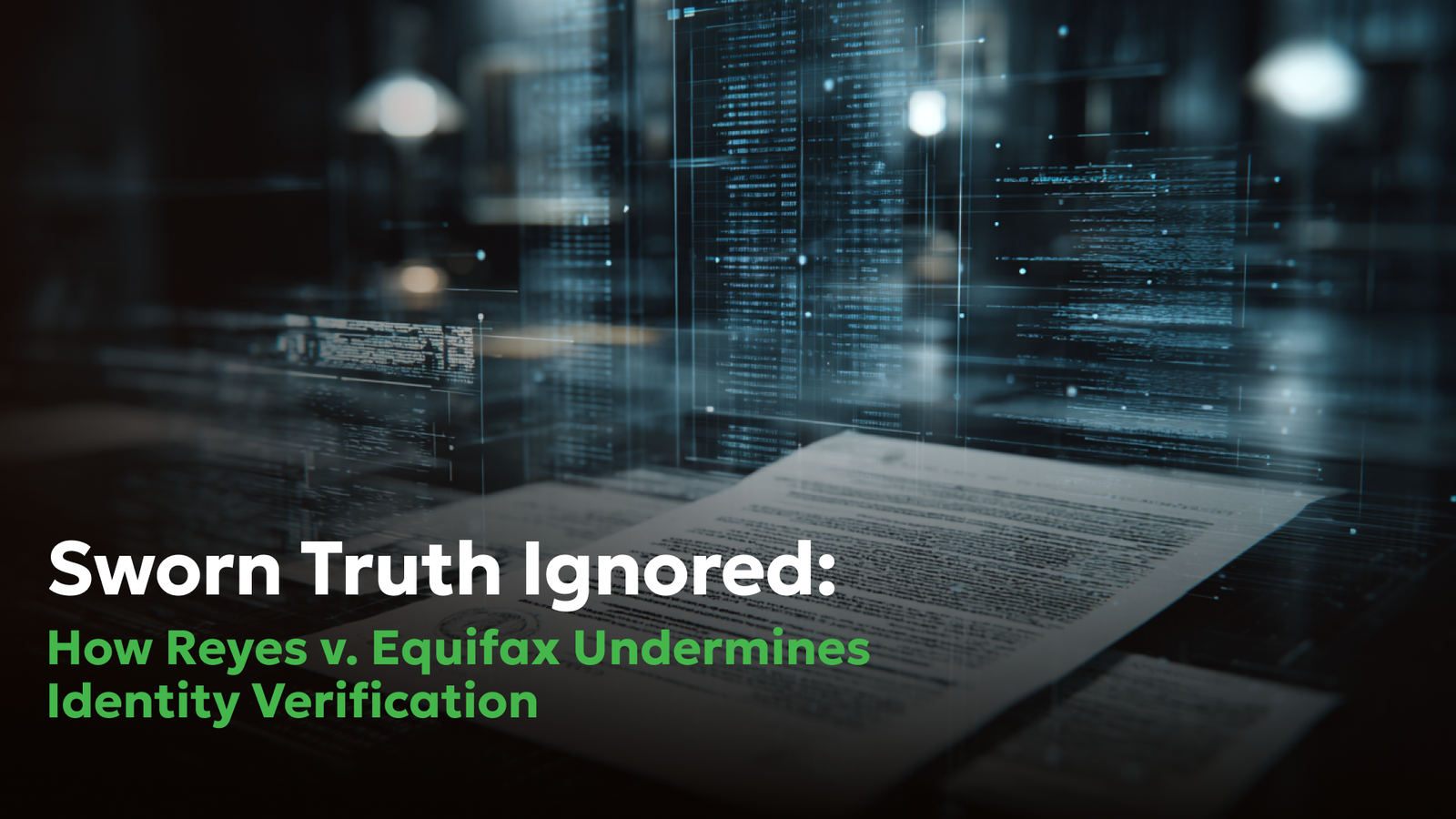What is Identity Theft, and How Does It Occur?
- Blog
- Credit Report Identity Theft
What is Identity Theft, and How Does It Occur?

Avoid becoming an identity theft victim. Learn from seasoned attorneys about the many ways identity theft happens.
Identity theft can upend your life, cause long-lasting financial and reputational damage, affect your emotional well-being, and erode your mental health. It’s a pervasive problem committed by highly motivated thieves. Knowing what identity theft is and how it happens is the first and best way to ensure you don’t become a victim.
Identity theft occurs when someone steals and uses your personal information without your permission. This information can include your name, Social Security number, credit card number, or other details. Thieves use this information to open new credit accounts, steal money from your bank accounts, apply for loans, or even get medical treatment under your name. The effects of this can be catastrophic and - in addition to the damage to your credit status and potential financial toll - can have a devastating effect on your emotional well-being, your relationships, and your mental health. It also takes time and effort to fix.
As consumer protection attorneys, we see the effects of identity theft on people’s lives every day. It’s a serious issue that can happen to anyone. Understanding what it is and how it works is the first step in protecting yourself.
The Most Common Types of Identity Theft
Identity theft can happen in many ways, but some types are more common than others:
- Financial identity theft. This is the most familiar type, where someone uses your information to access your financial accounts or open new ones. This includes credit card fraud, where thieves might use your credit card details to make unauthorized purchases.
- Medical Identity Theft. Here, someone steals your identity to get medical services or drugs. They might use your health insurance to get treatment, which can leave you with bills for services you didn’t use.
- Tax Identity Theft. Thieves use your Social Security number to file fraudulent tax returns with the IRS to get your refund. This can cause significant problems when you file your actual taxes.
- Employment Identity Theft. This occurs when someone uses your Social Security number to fake your identity to get a job and affects your taxes and government benefits.
- Criminal Identity Theft. This occurs when someone gives your name and other personal information to law enforcement during an arrest. If they don’t show up for their court date, you could have a warrant for your arrest under your name.
How Much of Your Identity Must Someone Steal Before It Becomes Theft?
Identity theft can happen with just one piece of personal information, but thieves usually need more to commit significant fraud. Sometimes, having your Social Security or credit card numbers is enough for a thief to cause problems. However, the more information they get, the more damage they can do. Sometimes just having your name or social media accounts can prompt a thief to contact you in an effort to get some more information. Therefore, keeping all your personal information safe is essential to prevent identity theft.
How Thieves Steal Your Identity
Because identity theft is so lucrative, thieves have developed many ways to do it. Here are some of them:
Phishing
Phishing is a deceptive practice where cybercriminals send fraudulent communications, often looking very official, to trick individuals into providing sensitive information. Phishing involves sending fake emails or creating fake websites that look like they’re from actual companies or banks. Here are some popular phishing scams and techniques that these criminals use:
| Type of Phishing | What It Is | How to Avoid or Prevent It |
| Email Phishing | Scammers send emails pretending to be from reputable companies or known contacts. These emails often urge you to click on a link or open an attachment that can install malware or direct you to a fake website. | Check the sender’s email address for any oddities. Be wary of emails that demand urgent action or use scare tactics. |
| Spear Phishing | More targeted than regular phishing, spear phishing involves emails tailored to the recipient, using gathered information to make the scam more convincing. The email might appear to come from a colleague or a boss, making requests for sensitive information or wire transfers. | Always verify any unusual requests via another communication channel, especially if it involves sending money or sensitive information. |
| Smishing (SMS Phishing) | Scammers use text messages to send fake alerts, offers, or warnings, enticing you to click on malicious links or respond with personal information. | Treat unexpected texts with caution, especially those with links. Verify any supposed issues by contacting the organization directly via official channels. |
| Vishing (Voice Phishing) | Phishing - but the thieves do it over the phone. Scammers might fake caller IDs (called “spoofing” and easy to do) to appear as if they’re calling from a bank, the IRS, a hospital,Immigration and Customs Enforcement, or any credible institution and ask for your personal or financial information. | If you suspect a call is a scam, hang up and call the organization back at its’ official number. |
| Search Engine Phishing | Scammers create fake websites or ads that show up in search engine results. When you click on these, you’re asked to enter personal information. | Use known URLs for financial transactions or personal information input, and avoid clicking on ads for sensitive operations. |
| Pharming | This technique redirects you from a legitimate website to a fraudulent one without your knowledge, even if you’ve entered the correct URL. | Keep your browser and security software updated. Use HTTPS websites, especially for financial transactions. |
| Pop-Up Phishing | Unexpected pop-up windows that mimic legitimate websites can appear while you browse, asking you to enter user information or download software. | Block pop-ups in your browser settings and never enter information into pop-ups. |
| CEO Fraud / Business Email Compromise | Scammers impersonate company executives in emails sent to employees, often requesting urgent wire transfers or sensitive employee data. | Implement two-factor authentication and verification procedures for financial transactions and sensitive requests, especially those received via email. |
Awareness of these phishing techniques and caution when handling your information can significantly reduce your identity theft risk. If you suspect you've fallen victim to a phishing scam, contact consumer protection attorneys who can guide you through the steps to secure your information and explore your legal options.
Physical Theft
This is one of the simplest ways identity theft happens. Thieves might steal your wallet, purse, or mail or even go through your trash to find bills, bank statements, or other documents that contain your personal information.
Data Breaches
Sometimes, big companies that have your information get hacked. This is called a data breach. If you’ve ever used your credit card at a store or have an account with a company that gets hacked, your information might be stolen this way.
Skimming
Skimmers are devices that thieves attach to ATMs or credit card readers. When you use your card at a skimmed machine, the device captures the information on your card’s magnetic stripe. The thieves can then use this information to access your accounts.
Public Wi-Fi
Public Wi-Fi can be dangerous if it’s not secure because thieves can intercept the information you send and receive. This can include login details for your bank account or other sensitive information.
Social Media Scams
Social media platforms are not just for connecting with friends and family; they have also become fertile ground for cybercriminals looking to steal personal information. Here are some popular social media scams of which everyone should be aware:
| Social Media Scam | What It Is | How to Avoid or Prevent It |
| Quizzes and Fake Apps | These seemingly fun quizzes ask for personal information or lead you to malicious websites. Fake apps, often pretending to be legitimate ones, trick you into downloading malware that can steal your information. | Avoid participating in quizzes that ask for personal details. Always download apps from official app stores and check reviews and ratings. |
| Phishing Links via DMs and Comments | Scammers send messages or post comments with links that lead to fake login pages or websites that ask for your personal information. | Never click on unsolicited links. Verify the sender's identity before responding to any direct messages. |
| Romance Scams | Scammers create fake profiles to form relationships with victims, eventually convincing them to send money or share sensitive information. | Be cautious with online relationships, especially if someone rushes into emotional attachment or asks for money. |
| Fake Friend Requests | Cybercriminals create fake profiles to become friends with you and then use that access to gather personal information or spread malware. | Only accept friend requests from people you know. Regularly review your friends list and privacy settings. |
| Impersonation of Real Friends or Family | Scammers hack or mimic the profiles of people you know to ask for money or personal information. They may also manufacture a crisis or emergency situation of some sort to play with your emotions, create a sense of urgency, and get you to suspend logic. | Double-check with your real friend or family member through another communication method if you receive suspicious requests. |
| Job Offer Scams | Fake job postings on social media promise lucrative opportunities but require you to pay a fee or provide personal details to apply. | Research the company offering the job. Legitimate employers will not ask for payment to apply. |
| Sweepstakes and Lottery Scams | You receive a message claiming you've won a prize but must pay a fee or provide account information to claim it. | Remember, if it seems too good to be true, it probably is. Never pay to receive a prize. |
| Investment Scams | Scammers promise high returns on investments through ads or direct messages, but these “investments” don’t exist. | Do thorough research before investing and avoid any offer that guarantees unusually high returns.
|
By being aware of these scams and knowing how to avoid them, you can protect your identity and ensure your social media experience remains safe and enjoyable. If you suspect a scam has targeted you, report it to the platform and consider contacting a consumer protection attorney to discuss your options.
Mail Theft
Thieves can steal your mail to get your bank statements, credit card offers, or other information. Always use a secure mailbox, and be careful about sending checks or sensitive information through the mail.
Shoulder Surfing
This happens when a thief watches over your shoulder as you enter your PIN at an ATM or your phone password. Always be aware of your surroundings, especially when entering sensitive information.
Dumpster Diving
Thieves are not above going through your trash to look for discarded bills, bank statements, or credit card offers. Shred any documents with personal information before throwing them away.
Because identity theft can be so lucrative, thieves are constantly developing new methods of stealing your identity.
What to Do if Your Identity Is Stolen
If you find out that your identity has been stolen, here are some steps you should take immediately:
- Contact one of the credit bureaus. Call Equifax, Experian, or TransUnion and ask them to put a fraud alert on your credit report. By law, the one you call must notify the other two. This will make it harder for the thief to open more accounts in your name.
- Freeze your credit. A credit freeze prevents anyone, including you, from opening new accounts until you lift the freeze. It’s an excellent way to protect yourself until you sort things out.
- Report to the FTC. The Federal Trade Commission (FTC) keeps a database of identity theft cases and can help you recover. Contact them to report the theft.
- File a police report. This might seem like a lot, but having an official report can help you deal with creditors and possibly catch the thief.
- Review your accounts. Look over all your bank and credit card accounts for any unrecognized charges. Report these to your bank or credit card provider immediately.
- Change your passwords. Change the passwords on all your accounts, especially if you think the thief might have access to them.
- Stay vigilant. After you've been a victim, keep an eye on your financial statements and credit report for a while. Sometimes, thieves hold on to your information and use it later.
How a Lawyer Can Help
The attorneys at Consumer Attorneys can help you recover from identity theft in several ways:
- Offer tailored legal advice.
- Deal with the consumer reporting agencies, especially if they do not comply with the law.
- Deal with creditors.
- Help you preserve your rights.
- Prevent future issues.
- Represent you in a lawsuit if circumstances so require.
Identity theft can be a difficult and frustrating experience, but you don’t have to handle it alone. Contact us if your identity has been stolen and you need help dealing with the aftermath - whether it’s five minutes after you discover your identity was stolen or years.
Frequently Asked Questions
The most common source of identity theft is “phishing.” Phishing is when identity thieves trick you into giving them your personal information. They might send you an email that looks like it’s from your bank or a website you trust and ask you to enter your password, Social Security number, or credit card details. Sometimes, they do this through fake websites or even phone calls. To be genuinely vigilant, always verify who’s contacting you before sharing personal info. Be careful with your information and think twice before clicking on links in emails or messages, especially if they ask for personal details or have manufactured some urgency.
According to the most recent statistics, the individuals most vulnerable to identity theft are people between 30 and 39 years old. This age group tends to be very active online, often sharing personal information on social media platforms and various websites. They are more likely to participate in online shopping, banking, and digital payment methods, which increases their exposure. Their busy lifestyles mean they might not always take the time to check the security of their data, making it easier for identity thieves to exploit their information. Being mindful of what they share and regularly monitoring their financial accounts can help protect them from identity theft.
To protect your Social Security number after it's been compromised, consider placing a credit freeze on your reports at Equifax, Experian, and TransUnion. This prevents new accounts from being opened in your name. Additionally, setting up a fraud alert requires businesses to verify your identity before issuing credit, enhancing your protection. You can block electronic access to your Social Security record for further security by calling the National 800 number (1-800-772-1213) or the TTY number (1-800-325-0778). This blocks any automated and electronic access to your information, ensuring no one can view or change it without your permission.
Yes, someone can potentially withdraw money from your account if they have your account number, especially if they also obtain routing information. This can happen through unauthorized electronic transfers, setting up fraudulent direct debits, or creating fake checks. To protect yourself, monitor your bank statements regularly for any unusual activity and report it immediately. Use secure methods when you share financial information, and be cautious of phishing attempts that ask for your account details. Setting up alerts with your bank to notify you of any transactions is also a good idea, helping you catch and respond quickly to unauthorized access. Remember, thieves are very good at what they do.
Credit cards are generally safer to use than debit cards. This is because credit cards offer better fraud protection. If someone makes unauthorized charges on your credit card, you’re usually only liable for up to $50 of charges you didn’t make. Additionally, many credit card issuers offer zero liability. With a debit card, your liability can be much higher, and your personal bank account funds are at risk. Credit cards often provide benefits like warranty coverage, purchase protection, and dispute resolution that debit cards don't offer. Using a credit card can also help build your credit score when used responsibly.


Daniel Cohen is the Founder of Consumer Attorneys. Daniel manages the firm’s branding, marketing, client intake and business development efforts. Since 2017, he is a member of the National Association of Consumer Advocates and the National Consumer Law Center. Mr. Cohen is a nationally-recognized practitioner of consumer protection law. He has a we... Read more
Related Articles




R
ONGS™You pay nothing. The law makes them pay.






